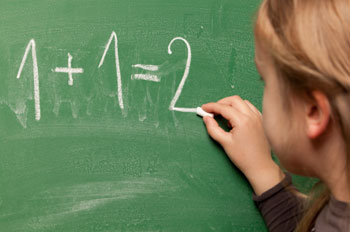Middle School Algebra: Curriculum Overview
In grades six, seven and eight, your child will begin learning about algebra. It is important for children to develop a solid skills base in this math area because they will have to use these skills throughout high school. Continue reading below to find out what algebra skills your middle school student needs to acquire.

How to Help Your Child Succeed in Algebra
To begin with, it's important that your middle school student can correctly use math terminology. For example, be sure your child knows what a variable is and how it should be used.
A good foundation is essential to mastery in the algebra content area. Your child will not be capable of solving an equation unless he or she can adequately add, subtract, multiply and divide. Lastly, providing your student with plenty of algebra practice outside of the classroom can help improve his or her performance.
Sixth Grade
At this grade level, your child should be able to read, write and evaluate expressions that involve variables. To be able to work with variables, sixth graders must understand that a letter can be used to represent an unknown number or any number in a given set. Your child should also understand that variables can be used in real-world problems to represent two quantities that change in relation to each other.
Your sixth grade student will know how to create equivalent expressions, as well as how to recognize expressions that are equal. This will often require your child to access prior knowledge of the properties of multiplication, such as the distributive or associative property. Algebra at the sixth grade level will also have students creating and evaluating expressions that include exponents. Lastly, be sure your child can solve equations using the form x + p = q and px = q.
Seventh Grade
In seventh grade, your child should be able to add, subtract, factor and expand linear expressions that include rational coefficients. Your child should also be comfortable solving multi-step problems that contain positive and negative numbers in the form of fractions, whole numbers and decimals. This will require your child to convert between the number forms and to use variables to stand for a quantity. You will also want to be sure your seventh grade student can use mental math and estimation to assess the reasonableness of his or her answers.
Eighth Grade
Students in eighth grade should be able to comfortably use what they know about integer exponents to generate numerical expressions that are equal. Your child will know how to estimate a large number by multiplying a single digit times a power of ten (e.g., 5 x 20). At this grade level, your student will be able to solve linear equations that contain one variable, as well as simultaneous linear equations.
You will also want to ensure that your child can solve problems that result in two linear equations containing two variables. Your eighth grader should also be able to solve problems that involve the use of cube root and square root symbols and numbers that are expressed in scientific notation.
Other Articles You May Be Interested In
-
Algebra for the IPad Generation

For many students, algebra inspires apprehension and dread. Today, students are increasingly dependent on tools, such as iPads and even their phones, that can do the work of algebra for them. This makes the job of a teacher trying to convey algebra's importance difficult. Yet there are still ways to make algebra relevant,...
-
Not Your Father's Algebra As 45 States Look to Math Reform

One plus one will always equal two...but just how students are taught math is going to change. Nearly every state in the country has adopted the Common Core Standards; for math, this means new and more in-depth approaches to teaching the subject. Have we seen the last of traditional algebra and geometry classes?
We Found 7 Tutors You Might Be Interested In
Huntington Learning

- What Huntington Learning offers:
- Online and in-center tutoring
- One on one tutoring
- Every Huntington tutor is certified and trained extensively on the most effective teaching methods
K12

- What K12 offers:
- Online tutoring
- Has a strong and effective partnership with public and private schools
- AdvancED-accredited corporation meeting the highest standards of educational management
Kaplan Kids

- What Kaplan Kids offers:
- Online tutoring
- Customized learning plans
- Real-Time Progress Reports track your child's progress
Kumon

- What Kumon offers:
- In-center tutoring
- Individualized programs for your child
- Helps your child develop the skills and study habits needed to improve their academic performance
Sylvan Learning

- What Sylvan Learning offers:
- Online and in-center tutoring
- Sylvan tutors are certified teachers who provide personalized instruction
- Regular assessment and progress reports
Tutor Doctor

- What Tutor Doctor offers:
- In-Home tutoring
- One on one attention by the tutor
- Develops personlized programs by working with your child's existing homework
TutorVista

- What TutorVista offers:
- Online tutoring
- Student works one-on-one with a professional tutor
- Using the virtual whiteboard workspace to share problems, solutions and explanations